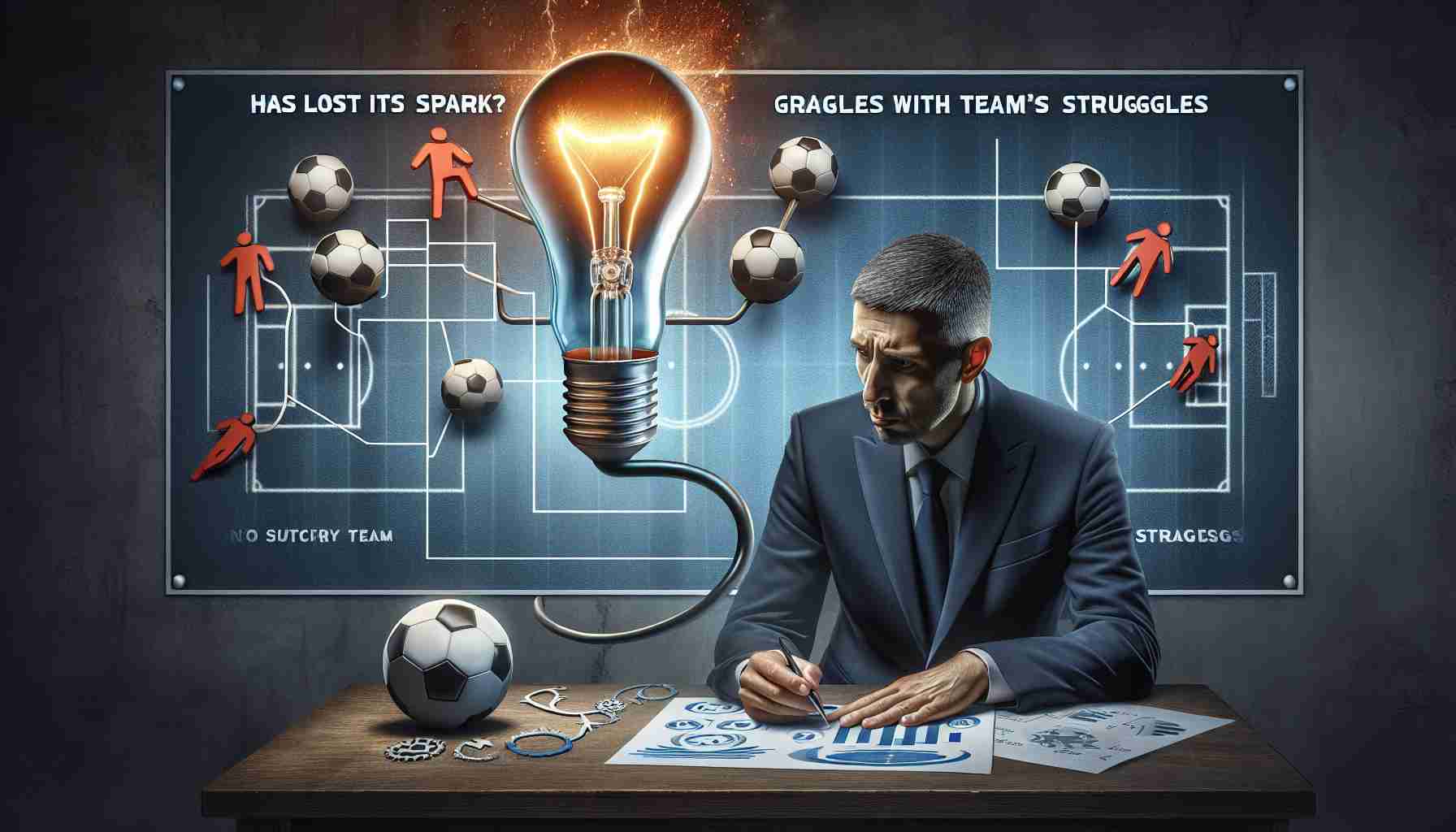- Pep Guardiola faces challenges as Manchester City’s dominance wanes, currently in fifth place.
- The team struggles with maintaining its trademark possession style and physical edge.
- Key injuries, including Manuel Akanji’s ten-week sidelining, highlight vulnerabilities.
- Jack Grealish’s uncertain fitness adds to the challenges before facing Newcastle.
- Nico Gonzalez offers potential solutions as the team looks to adjust tactics.
- Guardiola emphasizes adaptation and resilience in the face of fierce Premier League competition.
- The team’s future hinges on whether they can reclaim their former brilliance or evolve through determination.
Pep Guardiola, the mastermind who transformed Manchester City into a fearsome football powerhouse, confronts an unsettling truth: his once untouchable squad seems to lack its former sheen. The elegant tapestry of possession that suffocated rivals now shows threads of uncertainty. The giants of English football, conquerors of six league titles in seven years, find themselves adrift this season, languishing in fifth place—not far, yet worlds away from the top. Their title hopes have all but evaporated, and the Champions League looms ominously after a disheartening defeat to Real Madrid, casting shadows over their European aspirations.
Guardiola, standing on the pitch’s edge, admits the problem is complex, a mosaic of challenges rather than a singular fault. The precision with which City controlled games has eroded, and with it, the physical edge needed to match heartier adversaries. The league’s fierce competition pushes forward relentlessly, leaving City looking back at a glorious past.
To add to the woes, key defender Manuel Akanji endures the burden of injury, sidelined for up to ten weeks. His absence highlights City’s fragility, yet Guardiola lauds his relentless spirit. Midfield maestro Jack Grealish teeters on the brink of fitness, his potential absence casting doubt over the upcoming clash with Newcastle. Meanwhile, new recruit Nico Gonzalez might step up, offering hope amid uncertainty.
As Guardiola navigates these turbulent waters, one message resonates: adaptation is crucial. The Premier League is a relentless arena, and Manchester City must muster resilience, rediscovering the magic that once left opponents breathless. Can they rise to reclaim their throne, or will they evolve into a new form—driven not by possession, but by sheer determination? The next chapter awaits.
Pep Guardiola’s Manchester City: Navigating Challenges and Rediscovering Dominance
How-To Steps & Life Hacks: Reinvigorating Team Performance
1. Focus on Fitness and Recovery:
– Prioritize player rest and rehabilitation. Use techniques like cryotherapy, hydrotherapy, and personalized fitness regimes to expedite recovery, especially for injured players like Manuel Akanji.
– Introduce yoga and mindfulness sessions to improve mental acuity, crucial for maintaining competitive edge under pressure.
2. Tactical Adaptation:
– Shift formations more fluidly during matches to disorient opponents. Consider integrating a 3-5-2 formation to leverage wing-backs in the face of weaker defenses.
– Emphasize fast break transitions to surprise teams expecting possession-based play.
3. Leverage Data Analytics:
– Use advanced statistics to pinpoint weaknesses in match performances.
– Tailor training and strategy sessions based on data-driven insights to address specific areas of concern such as shot conversion rates or defensive lapses.
Real-World Use Cases
– Injury Management: Manchester City’s experience reflects the broader necessity in sports to balance a squad’s performance with its physical limits. Clubs like Liverpool have utilized similar injury management protocols to see key players return efficiently.
– Tactical Flexibility: Juventus under Massimiliano Allegri demonstrated how altering tactics mid-season can rejuvenate team form, moving from a possession-heavy style to a more balanced approach.
Market Forecasts & Industry Trends
The football industry is progressively witnessing a shift towards leveraging technology for performance enhancement. The global sports analytics market, as projected by MarketsandMarkets, is expected to grow from $1.9 billion in 2021 to $5.2 billion by 2026. Clubs investing in such technologies might gain competitive advantages.
Reviews & Comparisons
Guardiola vs. His Contemporaries:
– Guardiola’s Strategy: Known for possession-heavy “tiki-taka”, his past success has been challenged by teams employing high-pressuring strategies.
– Jurgen Klopp: His “gegenpressing” has been hailed for its intensity and swift stance-changing capabilities.
– Thomas Tuchel: Demonstrated tactical flexibility with PSG and Chelsea, quickly adapting to player strengths and opponent weaknesses.
Controversies & Limitations
1. Financial Fair Play (FFP):
– Scrutiny over City’s spending remains pertinent, with UEFA’s FFP rules often casting shadows over their transfer dealings.
2. Sustainability Concerns:
– Heavy spending and squad rotation can affect long-term financial sustainability, raising questions about sustainable club management.
Features, Specs & Pricing
– Squad Depth: City boasts one of the deepest squads in football; however, injuries to key players reveal vulnerabilities.
– Transfer Pricing: New recruits like Nico Gonzalez come at substantial fees, indicative of the club’s aggressive transfer strategy.
Security & Sustainability
– Player Security: High-profile players like Grealish face immense media scrutiny; clubs must focus on mental health support.
– Sustainability Initiatives: City has been involved in initiatives aiming at reducing the carbon footprint of their stadium and operations.
Insights & Predictions
Given current trends, Manchester City may need to pivot towards a model that integrates experienced players with emerging talent, harnessing youthful energy with tactical versatility. This approach might also align with UEFA’s long-term sustainability directives.
Tutorials & Compatibility
– Training Platforms: Clubs are increasingly adopting platforms like Hudl and Coach’s Eye to enhance player performance insights.
– Player Gear Compatibility: Ensuring that training gear is compatible with monitoring technology such as GPS vests is becoming essential.
Pros & Cons Overview
– Pros: Deep talent pool, strategic management experience, and a track record of innovation.
– Cons: Vulnerability to injuries, pressure from financial regulations, and the need for tactical evolution.
Actionable Recommendations
– Embrace Tactical Versatility: Train players to adapt seamlessly between formations and defensive setups.
– Innovate Training Regimen: Incorporate AI-driven personalization in fitness programs.
– Enhance Squad Morale: Foster a team-oriented culture that thrives under shared challenges.
To gain further insights on Premier League strategies and updates, visit Premier League.
